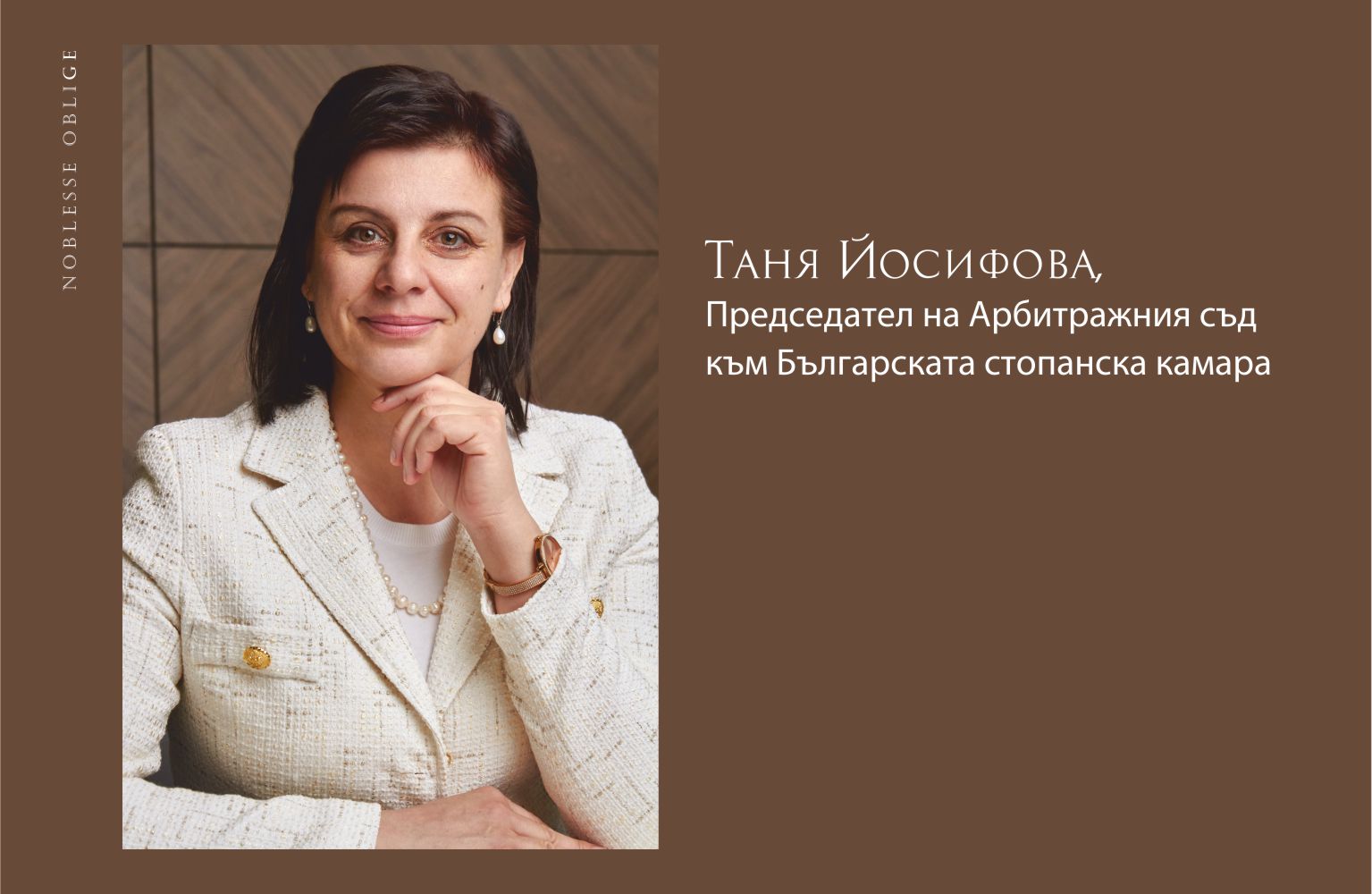Tanya Yossifova, Chair of the Court of Arbitration at BIA
Tanya Yossifova is the Chairperson of the Court of Arbitration at the Bulgarian Industrial Association, a long-standing arbitrator and lawyer. Professor of Civil and Family Law at the Faculty of Law of the University of National and World Economy and author of three monographs in the field of civil and commercial law, articles, reports, and statements to the Constitutional Court and the Supreme Court of Cassation. Prof. Yossifova has been a lecturer at seminars and courses on information technology law.
Professor Yossifova, the Court of Arbitration at BIA joined the Campaign for Greener Arbitrations (CGA). What are the requirements that arbitral tribunals have to comply with as partners of this initiative?
The Campaign for Greener Arbitrations is a reflection of processes in the economy related to environmental sustainability, including the activities of arbitrations. The Global Initiative for Greener Arbitrations was founded by international arbitrator Lucy Greenwood in 2019 and aims to reduce the carbon footprint of arbitral tribunals by raising awareness among the arbitration community and changing the behaviour of all those involved in the process by promoting best practices in managing arbitrations in a sustainable manner. The campaign is supported by arbitration institutions, law firms, corporations, educational institutions and think tanks from all around the globe.
As a campaign partner, the BIA Court of Arbitration adheres to the so-called "Green Protocols", which concern the conduct of arbitration hearings, the activities of arbitrators, the arbitration procedures, arbitration conferences and more. All of these are aimed at protecting the environment. We strictly follow the guiding principles set out in the Campaign - we prefer to conduct our correspondence electronically unless it needs to be on paper, we encourage video conferencing where possible (including at hybrid events), we avoid unnecessary travel, and we require electronic documents and avoid printing. We try to use product and service providers that have committed to reducing carbon dioxide emissions.
Do the peculiarities of the arbitration procedures allow the implementation of such modern means of environmental protection?
Non-judicial dispute resolution methods such as arbitration and mediation allow environmental protection and digitalization to go hand in hand. These processes are linked because the procedures in the Court of Arbitration are more flexible, they aim at minimizing costs, effort and time. At the same time, the quality of the procedure and the final act of the deciding panel remain intact. These processes improve communication and convenience for the parties involved.
Could you tell us about the novelties in the digitalization of the arbitral tribunal's activities?
Digitalization in our Court of Arbitration is proceeding in several directions. In accordance with the requirements of Article 31(2) of the Law on International Commercial Arbitration, we have established a system for remote access to the Court of Arbitration's cases, whereby the arbitrators of the Arbitral Tribunal, the parties and their legal representatives can access the case materials remotely. They can make enquiries and electronic submissions remotely, including through the use of an electronic signature.
We also offer mediation services with a wide area of application, and we are currently creating an online mediation platform, a specialized software, in which the electronic identification of the participants in the process is integrated.
Tell us more about the remote access filing system.
The system is designed for the decision makers’ work and the involved parties.
The information for each case includes data on the parties and their legal representatives, the deciding chamber and all the documents in the case, structured by type - applications, minutes of hearings, documents from the experts, and correspondence.
The data are digitized by the Secretariat of the AC, and interested parties receive notifications of each new document. The data access is managed on roles and relationship type to the case. User registration and data access are provided independently by the AC Secretariat after obtaining consent for e-notifications. Provision shall be made to store the case inventory in pdf format. Data shall be exchanged in an encrypted format. All user actions shall be recorded in a system log for audibility and traceability of actions and events.
For the convenience of arbitrators, we have created a library of decisions on previous AC cases, as well as forms for standard case documents. Functionality is available for internal communication on casework papers between arbitrators of the Arbitral Tribunal.
The Bulgarian Industrial Association provides technical support. BIA holds ISO 9001:2015 and ISO/IEC 27001:2013 certificates for information security. Automatic data backup, redundancy of internet connectivity and power supply, load control, monitoring and protection from DoS/DDoS attacks are ensured.
The system is built modularly and is based on an object-oriented approach and an architectural model which is based on the separation of business logic from the visual interface and application data, allowing easy upgrades with new functionalities.
Where can we find more information about the Court of Arbitration at BIA?
We publish up-to-date information related to the Court of Arbitration and its activities on the website of the AC at BIA - https://arbitration.bia-bg.com/. There you can find a list of arbitrators and mediators, sample contracts, interesting decisions from our arbitration practice, a sample arbitration clause to include in your contracts or general terms and conditions, and contacts of the Court of Arbitration. We also publish articles and interviews of members of the Arbitration College, as well as standpoints on current legal issues. On the website, you can also find the Rules of Procedure, the Statute of the Court of Arbitration and the Schedule of Arbitration Fees and Costs in domestic, international and ad hoc cases. Information is also available through the AC's new social media accounts on Facebook and LinkedIn.
The AC Secretariat provides information to all interested parties on how the AC operates, the list of arbitrators and mediators, the arbitration clause, arbitration proceedings and mediation, by all confidentiality requirements.






